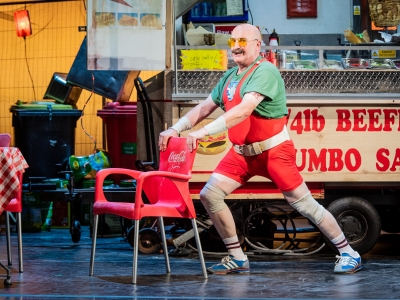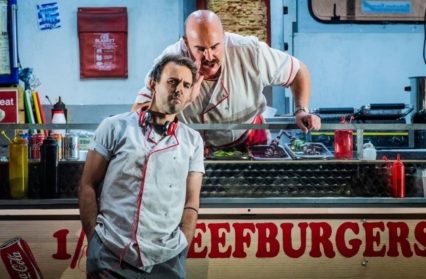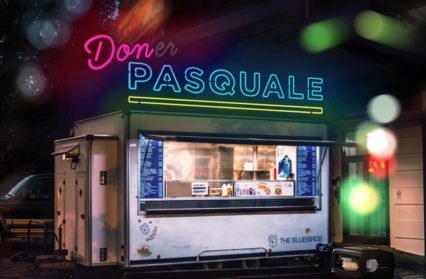Nigel Jarrett attended the first night of WNO’s new production of Donizetti‘s comic opera, Don Pasquale which follows characters such as Don’s nephew, Ernesto.

Welsh National Opera’s hilarious re-invention of Donizetti’s Don Pasquale, a 19th-century comedy in which the young subvert the crotchety desperation of the old, raises only one issue: What will opera-goers in England on the company’s tour understand by the adjective ‘tidy’? Indeed, how will they cope with the rest of the Valleys vernacular in which the libretto of Donizetti and Giovanni Ruffini has been cast? Having taken Gavin & Stacey to be a wholly comprehensible hoot, it’ll surely present no problem more serious than how long it might take Deliveroo to reach their doors with a hot doner or shish.
Nor will the re-telling take much time to be absorbed. Immigrants from the heel of Italy have long been welcomed and established in South Wales, often as café owners, so a doner-kebab van run by someone called Pasquale is no stretch. There might even be two in Glynneath. Nor would audiences expect a Welsh opera company – there are a few – to decline lodging a production in Wales with such colourful characters and situations at its disposal. It’s been done, but maybe not with such clunking lack of inhibition as WNO displays here. Donizetti. Shouldn’t that be Donerzetti?
Let’s deal with the transposition first of the Don Pasquale production. Few opera-lovers baulk these days at odd or altered settings. They are used to Wagner’s Ring cycle being enacted in a derelict shopping mall, or Verdi’s La Traviata shifted to a mansion in Virginia at the time of the American Civil War, with Violetta’s TB emblematic of Secessionist sickness. Points are made and, with goodwill, points are taken. In this new Pasquale, however, director and libretto translator Daisy Evans has dared to re-write. And why not? That an opera with an amusing course of events should be deflated at the end by the bathos of an outmoded moral lesson, especially one set to such lively music, might be regarded as almost an affront. Having changed so much earlier on, the idea of the opera’s eponymous grumpy coming round to the enlightenment of those who had tried to hoodwink him is not much of a weight to bear.
The slippered pantaloon that is Pasquale in Donizetti’s original now owns a doner kebab cabin on wheels. Nephew Ernesto is his shiftless helper with dreams of becoming a rock star. Malatesta, a doctor back in 1843 and in some productions Pasquale’s coeval, has become a ducking and diving cross between Russell Brand and Shakin’ Stevens. Norina, Ernesto’s beloved, sells fruit and veggie juice at £4 a throw. And the orchestra, reduced to seven, has risen from the pit to join the cast on stage and, as characters themselves, a band, represent the music-makers in whose sounds youth seems to lodge whatever dreams it has of changing lives. Pasquale wants to change his. Because Ernesto refuses to marry a woman he has lined up for him, the doner sales enterprise will not be his legacy. Ernesto loves Norina, and Malatesta contrives to ‘marry’ Pasquale off to a beautiful woman (Norina in disguise and supposedly Malatesta’s sister). The idea is that she will eventually inherit. But she will make Pasquale wish he’d never set eyes on her and he will have to let her go. The charade is unravelled and everyone lives happily ever after in a land free of plastic waste – or something like that.
The re-write wouldn’t work for the literal-minded, the original being less far-fetched. Who’d want to inherit a grubby kebab van unless it were the centre of a shish empire, which it obviously isn’t (unless there’s a Doner Van War going on in the Swansea valley)? And how do you conduct a marriage ceremony without leaving the doner hinterland?

The latter is easy. Just keep suspending disbelief. It allows the ‘marriage’ scene (so original it merits a spoiler alert that it isn’t going to get) to be doubly funny. A wedding by Skype is transmitted on a pull-down screen inside the van conducted by Malatesta on a tablet with a remote notary not unadjacent in feature to Bryn Terfel. In fact, it is Bryn Terfel. The scene is outrageously weird but brilliant. Never has an opera character present only in ghostly two-dimension threatened to steal the show. Evans’s ruse of having Pasquale’s nemesis take the form of a transformation of his business into a vegan hell is equally inspired. The letter from Ernesto dropped by ‘Norina’ and picked up by Pasquale is an invitation to a tryst behind the van to which she’s invited to bring a ‘lush’ salad takeaway with beetroot. The re-fashioning is total and includes an arrangement of the score by Stephen Higgins played zippily or dreamily by him (at a keyboard) and six others. Not the least achievement of this production is the way the singers are never in Higgins’s sight-lines to take cues.
Evans’ only gamble must have been that such a total re-working of words, music, and scenario might appeal to the Welsh, particularly South-East Walians, but less so to non-Welsh audiences on tour. More than that – and it’s a valid objection – she might have lost Donizetti himself. There is something of a disconnect separating the mostly believable antics and the music written as a vehicle for them. What is remembered at the end – the sights we’ve seen or the sounds we’ve heard? Ideally, both. The uniformly up-for-it cast of Andrew Shore (Pasquale), Nico Darmanin (Ernesto), Harriet Eyley (Norina) and Quirijn de Lang (Malatesta) sometimes project that extra shrill decibel to ensure that the transformation of meaning in their big moments – Ernesto’s dreams of rock stardom surely the most vivid – does not devalue the music illustrating them. Like troupers, they milk their parts to dryness.
The supporting team of the Don Pasquale production take their plaudits too, not least designer Loren Elstein for the scene in which the van’s doner pillar is replaced by a giant carrot, and lighting designer Jake Wiltshire in encouraging Ernesto in his dream of fame in the spotlight. The original moral, that old men who want to marry are asking for trouble, has long wilted. Evans’s replacement certainly accords with her characters’ wish to see young love triumph over a duffer’s late and confused machinations. She may even have encouraged her audience to head straight for a kebab house – or a juice bar – after the show. Opera. Doncha love it?
Don Pasquale is on tour until July 13, calling at the Taliesin Arts Centre, Swansea (June 1); Torch Theatre, Milford Haven (June 6); Theatr Clwyd, Mold (June 26); Pontio, Bangor (July 4); Theatr Brycheiniog, Brecon (July 6); Coliseum, Aberdare (July 9); with other dates in England. Details on www.wno.org.uk/pasquale.
Nigel Jarrett is a freelance writer and critic. He’s a regular contributor to Wales Arts Review on music and other subjects. He won the Rhys Davies Prize for short fiction, the Templar Shorts award, and is the author of four books. He’s represented in the Library of Wales’s anthology of 20th– and 21st-century short stories.



 Enjoyed this article? Support our writers directly by buying them a coffee and clicking this link.
Enjoyed this article? Support our writers directly by buying them a coffee and clicking this link.







